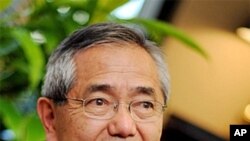Purdue University professor, Japanese Ei-ichi Negishi is a co-recipient of the 2010 Nobel Prize in Chemistry. He shares the award with Japanese Akira Suzuki of Hokkaido University and American Richard Heck of the University of Delaware. Together, their work created a method to build complex organic molecules that are now used to manufacture a range of products - from pharmaceuticals to electronics. Our correspondent spoke with Negishi at his office in Indiana shortly after the Nobel announcement was made.
For 75-year-old Ei-ichi Negishi, winning the 2010 Nobel Prize in chemistry was an achievement more than 30 years in the making.
Negishi's research led to metal based reactions, called palladium catalyzed cross coupling, that enables the synthesis of complex organic compounds.
"It's like a LEGO game with chemical pieces," said Professor Negishi.
Negishi says his research discovered which metals serve as a catalyst to get organic compounds to "snap" together with other compounds.
The result is a process that efficiently and economically builds materials used to make products such as medicines to treat the HIV virus and colon cancer, and liquid visual displays for modern electronics.
"And many of them, used on TV display panels or cell phones - these liquid crystals, they are synthesized by using our cross coupling," said Negishi.
Although most people have used products that stem from Negishi's research, he says the medical benefits have been the most rewarding for him.
"Just by looking at the TV screen - without knowing what is behind the panel, you wouldn't appreciate what we have done," he said. "But medicine, if you take [it] and your life and health is improved or saved, and then you learn the process of making - what kind of chemistry has been used - I'm sure people will appreciate [it]."
Negishi is the third Purdue University professor win a Nobel Prize. His mentor, chemist Herbert C. Brown, was a co-recipient of the award in 1979. Negishi and fellow Nobel recipient Akira Suzuki studied under Brown at Purdue.
Negishi is the author of two books and more than 400 scientific articles. He says there is more research to perform in the ever-advancing field that led to his Nobel Prize.
"I can predict that many more innovative and modern advanced synthetic metals will arise," he said.
The Nobel Committee will present the $1.5-million award to Negishi and his fellow co-recipients in December in Sweden.
American, 2 Japanese Win Nobel Prize in Chemistry





